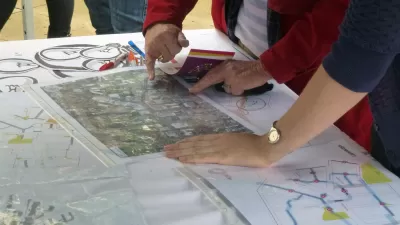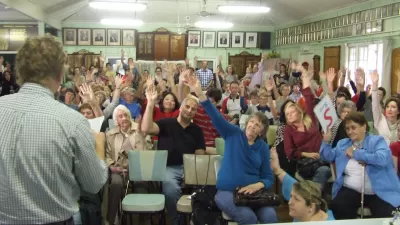In participatory planning, there is no planning without several events known as charrettes, which you probably already knew. Less likely to be common knowledge, however, is how charrettes can live up to their promise in the planning process.

In participatory planning, there is no planning without several events known as charrettes, which you probably already knew. What's not clear, however, is how charrettes can live up to their promise in the planning process.
"Design charrettes are, in theory, a valuable component of the urban planning process that help communities take a little bit of ownership over the changes coming to their streets," according to an article by Josh Cohen.
But there's a but: "In practice, that is often not the case," adds Cohen.
In the hopes of improving this staple of contemporary planning practice, Cohen speaks a collection of expert practitioners of charerretts to gather there thoughts on how improve charettes. Those points, with more detail in the article: 1) Your charrette must be a charrette, 2) Do more and better outreach, 3) Set realistic expectation, 4) Communicate more clearly, and 5) Provide real feedback.
FULL STORY: 5 Ways Planners Get Charrettes Wrong

Planetizen Federal Action Tracker
A weekly monitor of how Trump’s orders and actions are impacting planners and planning in America.

Restaurant Patios Were a Pandemic Win — Why Were They so Hard to Keep?
Social distancing requirements and changes in travel patterns prompted cities to pilot new uses for street and sidewalk space. Then it got complicated.

Map: Where Senate Republicans Want to Sell Your Public Lands
For public land advocates, the Senate Republicans’ proposal to sell millions of acres of public land in the West is “the biggest fight of their careers.”

Maui's Vacation Rental Debate Turns Ugly
Verbal attacks, misinformation campaigns and fistfights plague a high-stakes debate to convert thousands of vacation rentals into long-term housing.

San Francisco Suspends Traffic Calming Amidst Record Deaths
Citing “a challenging fiscal landscape,” the city will cease the program on the heels of 42 traffic deaths, including 24 pedestrians.

California Homeless Arrests, Citations Spike After Ruling
An investigation reveals that anti-homeless actions increased up to 500% after Grants Pass v. Johnson — even in cities claiming no policy change.
Urban Design for Planners 1: Software Tools
This six-course series explores essential urban design concepts using open source software and equips planners with the tools they need to participate fully in the urban design process.
Planning for Universal Design
Learn the tools for implementing Universal Design in planning regulations.
Heyer Gruel & Associates PA
JM Goldson LLC
Custer County Colorado
City of Camden Redevelopment Agency
City of Astoria
Transportation Research & Education Center (TREC) at Portland State University
Camden Redevelopment Agency
City of Claremont
Municipality of Princeton (NJ)





























